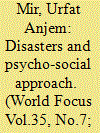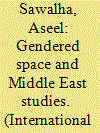|
|
|
Sort Order |
|
|
|
Items / Page
|
|
|
|
|
|
|
| Srl | Item |
| 1 |
ID:
132499


|
|
|
|
|
| Publication |
2014.
|
| Summary/Abstract |
Disasters both manmade as well as natural often result in great physical and material loss for the affected communities, besides affecting the social, physical and psychological well-being of the survivors in its aftermath. It has been seen that disasters have an adverse impact on the survival, dignity and livelihoods of individuals and communities, particularly of the poor, in both developed and less developed countries. There are multiple factors which have been attributed as causes of these extreme events, like environmentally unsound practices, global climatic changes, population growth, urbanization, social injustice, poverty etc. However, when it comes to comprehension of disasters in contemporary times, there is a need to look at disaster as social phenomena. This is precisely, with regard to man- nature relationship discourse. While explaining this relationship, Kroeber (1939 p1), rightly writes, ' while it is true that cultures are rooted in nature, and can therefore never be understood except with reference to that piece of nature in which they occur, they are no more produced by that nature thana plant" is produced or caused by the soil in which it is rooted. The immediate causes of cultural phenomena are other cultural phenomena.
|
|
|
|
|
|
|
|
|
|
|
|
|
|
|
|
| 2 |
ID:
131544


|
|
|
|
|
| Publication |
2014.
|
| Summary/Abstract |
Aspects of space and place shape daily life, social structures, politics, and intimate relations among people. In the late 1980s and 1990s, anthropologists, geographers, and sociologists-influenced by the writings of Michel Foucault and Henri Lefebvre on the meaning of social space-started to highlight the spatial in their analysis of social phenomena. These scholars focused on the production of urban space and asserted that space is dynamic and often shaped by the needs of its users as well as by those who design it. With the exception of Setha Low's work on Latin America, these writings were mostly centered on the United States.
|
|
|
|
|
|
|
|
|
|
|
|
|
|
|
|
|
|
|
|
|